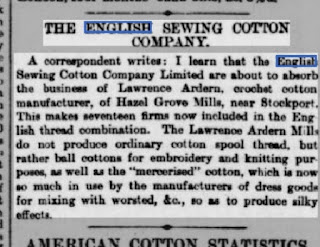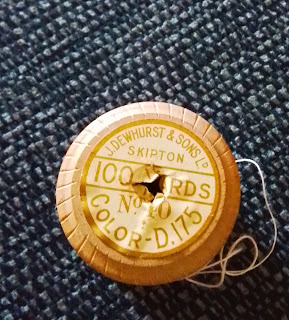Mrs Carthy Remembers
It is rare to find first hand accounts of working for an ESCC establishment, but here is one found in a book about the history of Skipton.
Extract from "Looking Back at Skipton" by Margaret Lancaster published by the author in 1990. Page 89.
"Mrs Dorothy Carthy records her experiences of working for the firm [Dewhursts].
In March 1939 I went to work at John Dewhurst & Co Ltd, part of the English Sewing Cotton Company in Skipton. When vacancies at local firms occurred, they often rang the Girls' High School to see if they had any girls who were interested - I went for an interview and on entering the building was greeted by a commissionaire complete with gold braid, and eventually I was informed that the job was mine. I was the shorthand typist in the Thread Office, starting work at 7.45am and finishing at 5.30pm and working on Saturday morning until mid-day, one hour for lunch and the wages were £1 per week. Fares to Skipton had to be paid out of this, but the firm paid half which was very good as other firms paid no contribution to fares. I left home in Barnoldswick on the 6.50am bus and arrived back at 6.20pm almost a 12 hour day. Secure jobs were important at this time and working at Dewhursts was considered to be a job for life. There were many departments in the Thread Section, which comprised the central block of the mill buildings, the Spinning Department being nearest the houses on Broughton Road. On my first morning I was taken through the departments on my way to the Thread Department Manager's Office which was on the top floor across the corridor over Brewery Lane. I remember passing through the Polishing, Hand Spooling and Cop section on the way, The Dyehouse was on the other side of the road. A kind of gantry connected the buildings and letters could be sent over in a cylinder through a series of tubes housed in the Thread Office. All Workers including the office staff were supplied with two overalls with a different colour for each department. The Office staff's were green and we each had a locker where we could hang our coats etc....
Most people went home for dinner and there was a great exodus from Dewhursts at 12.30. Those who travelled to work would eat their sandwiches in the Welfare but most people in Skipton went home....
The effect on Dewhursts [of WW2] was immediate, as the spinning department went on to overtime working, starting at 6am producing thread in khaki and blue for the Army and RAF...but travelling in the black out was not easy so when a job became available in Barnoldswick I left Dewhursts but still have happy memories of working there."
The book notes that the announcement of closure came in February 1983, with 240 jobs lost. At time of writing (1990) the premises were being used to manufacture Kingsley Cards and plastic spools.




Comments
Post a Comment